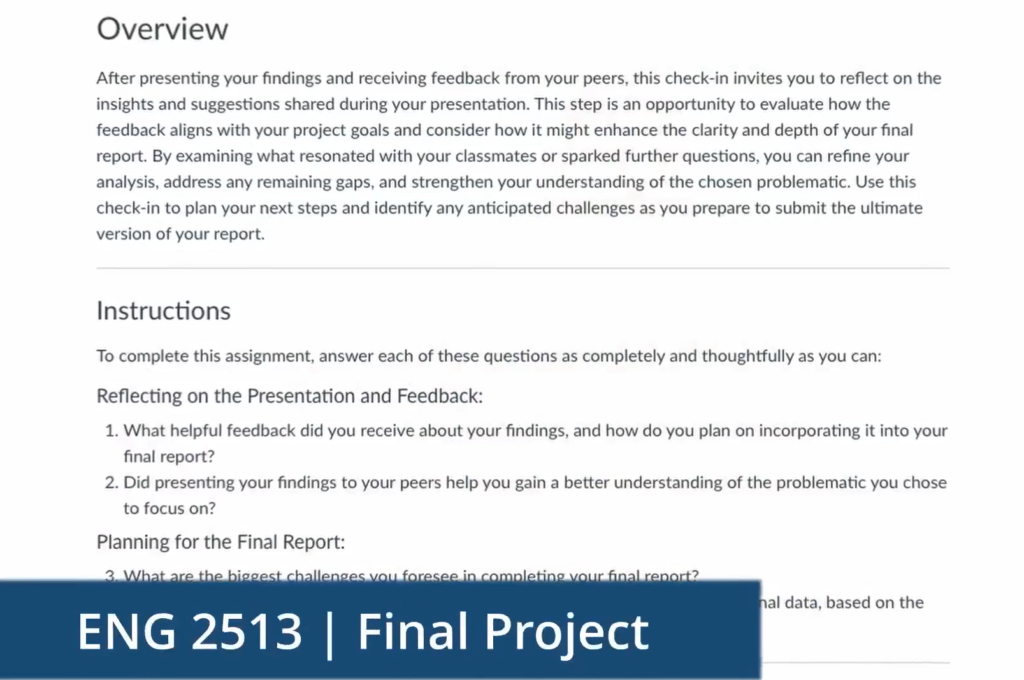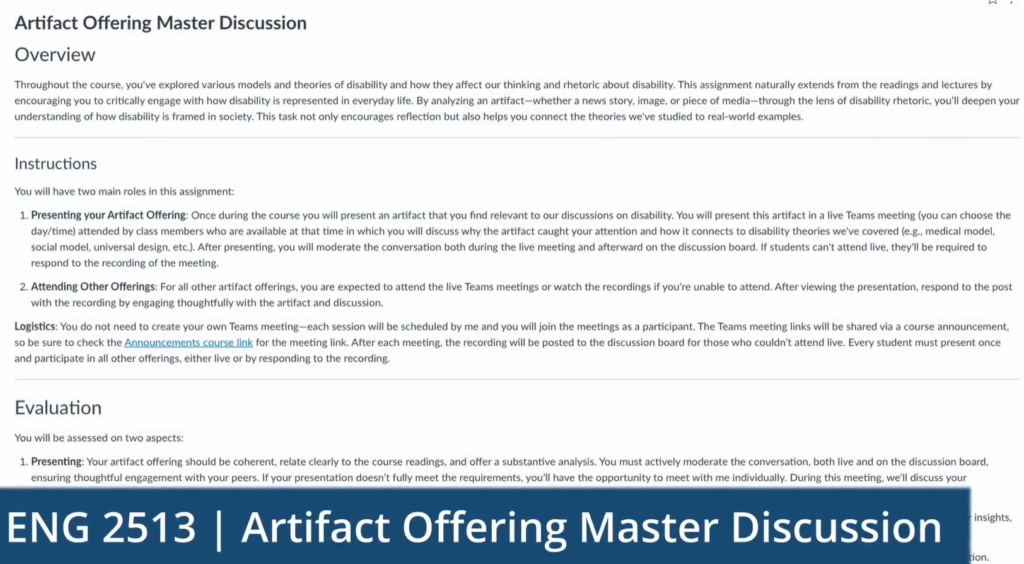Last updated on March 14, 2025
In the CTLD Course Development Cycle, MSU Denver instructors work with the instructional design team to improve their existing or new courses. Instructors identify course objectives, develop learning activities, create user-friendly courses, record high-quality multimedia content, and more.
As part of the Fall 2024 development cycle, English instructor Dr. Elizabeth Kleinfeld worked with the CTLD Instructional Design Team to create an online asynchronous version of ENG 2513, Disability Rhetoric. In partnership with the CTLD, Dr. Kleinfeld developed a course with opportunities for metacognition, and creative assessments that foster a participatory feel in an online environment, and implemented a grading system that allows students to revise and resubmit their work after receiving feedback.
Dr. Elizabeth Kleinfeld developed early interests in writing and social justice that shaped her academic career. Her commitment to accessibility and inclusive education led her to MSU Denver, where she serves as Professor of English and Writing Center Director. After earning her PhD in Rhetoric and Composition from Illinois State University, where she focused on writing center pedagogy and rhetoric, she built a career combining scholarly work with advocacy for accessible education. Her work bridges academic and public writing, from scholarly publications on disability in higher education to her memoir-writing and blog about navigating widowhood. She finds teaching disability studies especially rewarding, allowing her to challenge ableist assumptions while fostering more inclusive academic spaces.
Contents
Video Spotlight
Showcase examples:
Practicing Metacognition

- Metacognition refers to the ability to reflect on and regulate one’s learning processes, including identifying strengths and weaknesses, planning, and monitoring progress. Research shows that metacognitive skills improve students’ ability to direct and apply their learning in new settings. Dr. Klienfeld wanted to encourage her students to develop their ability to reflect on their learning and make decisions accordingly. She integrated metacognitive strategies throughout the course using activities that prompt students to evaluate their work. For example:
- During lectures, students use ungraded writing prompts to reflect on their understanding of the topic. After the lecture, they revisit these prompts to assess how their initial thoughts align with what they learned. This process encourages them to evaluate their preconceptions and monitor their learning critically.
- The final project, an institutional ethnography, is broken into five stages with key deliverables. Between stages, students complete check-ins to evaluate their progress, identify areas for improvement, and plan the next steps. This encourages consistent reflection and forward planning, helping them stay engaged and on track.
Collaborative Assessments
- One major point of emphasis for Dr. Kleinfeld when converting the course from online synchronous to asynchronous format was to try to capture as much of the learner-to-learner interaction that made the previous iteration of the course successful. Drawing on Social Constructivist Learning Theory, which emphasizes learning as a social process built through interaction and shared meaning-making and connectivism, which emphasizes learning as a process of forming and navigating connections across diverse networks, she redesigned several key assessments to foster the collaboration and engagement she was looking for. Here are a few examples of the redesigns:
- Disability Theory Debate: This activity was originally a free-form, in-class debate on theories of disability, such as the medical model. It was restructured into a two-week discussion where groups alternate debating for or against a theory while the rest of the class spectates and votes anonymously on the strongest argument. This format keeps the interaction dynamic and ensures all students experience both roles.
- Artifact Offering Discussion: This assignment asks students to choose an artifact related to disability rhetoric, analyze it, and connect it to course concepts. They share their findings with the class in a discussion that asks them to relate the material to real-world contexts, engage with diverse perspectives, and identify meaningful connections between the course and external examples.

Contract Grading
- This won’t be a surprise to many, but students spend a great deal of emotional energy stressing out about grades in your course. To combat this, Dr. Kleinfeld uses contract grading. Contract grading is a system where students earn their grades by completing assignments to a passing standard, with opportunities for revision and no penalties for mistakes. This approach emphasizes effort and improvement over penalties for errors. She used this type of grading with these strengths in mind:
- Writing is a skill that takes time and practice to master. The revise-and-resubmit policy ensures students can learn from their mistakes and improve without being penalized, fostering meaningful growth over the course of the class.
- Traditional grading can create unnecessary pressure and discourage risk-taking. By focusing on consistent effort and providing clear expectations, Dr. Kleinfeld’s use of contract grading aims to reduce stress and promote an equitable learning environment where students can focus on meaningful engagement.
Conclusion
Dr. Kleinfeld’s ENG 2513 course redesign exemplifies a thoughtful approach to fostering meaningful engagement and supporting student success. Metacognitive strategies are embedded throughout the course, helping students develop the critical skill of reflecting on their learning and making informed decisions to improve. Collaborative assessments, such as the reimagined Disability Theory Debate and Artifact Offering Discussion, ensure that learner-to-learner interaction remains a key part of the asynchronous experience, encouraging dialogue, connection, and shared understanding. Finally, the use of contract grading creates a low-stress, equitable environment where students are encouraged to focus on effort, revision, and growth, rather than penalties for mistakes. These innovations reflect Dr. Kleinfeld’s dedication to designing a course that supports collaboration, critical thinking, and meaningful learning outcomes.
Partnering for Continuous Improvement in Teaching and Learning
A significant factor in the success of these and similar projects is the support and funding from the Offices of Online Learning (OOL) and Innovative and Lifelong Learning (I&LL), which have been instrumental in enhancing the quality of our online educational endeavors. OOL’s and I&LL’s support and contributions have empowered faculty members to innovate and create a more enriching educational environment for all. Please visit the Office of Online Learning and Innovative & Lifelong Learning for more information about all that they are doing to help MSU Denver faculty members and students.
Want to get involved?
One way to find help with implementing student supports in your course is the CTLD Course Development Cycle. This is an intensive, but rewarding, process where an instructional designer will work with you over the course of several months to identify course objectives, develop learning activities, create a user-friendly course, record high-quality multimedia content, and much more.
For more information on the CTLD Development Cycle, as well as how to apply to join, please see our CTLD Course Development Cycle spotlight.
Have questions?
Want help on this or other teaching and learning topics? Please visit us for drop-in support (10 am-3 pm, M-F) or try one of our self-help tutorials.